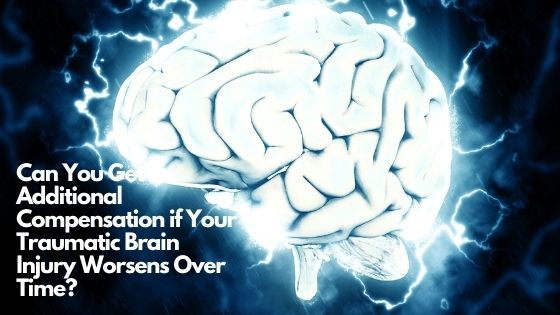A traumatic brain injury or TBI comes with a lot of stress, as often the adverse effects of a brain injury aren’t immediately apparent and can last a lifetime. To determine the compensation that a plaintiff is eligible for, one needs to understand the two different types of head injury damages: economic and non-economic.

The economic damages refer to replacing the financial losses someone suffers due to the head injury. These include medical costs, treatment plans, lost wages and future earning losses, property damage. Non-economic damages, on the other hand, deal with losses that are harder to define. These include less tangible matters such as loss of companionship and consortium, pain and suffering, mental anguish, emotional distress, etc.
How a personal injury lawyer can help
An experienced traumatic brain injury attorney will be able to advise if you have a legal claim to damages. Generally, if your brain injury resulted from the willful or negligent acts of another party, you will have a legal right to damages. A personal injury attorney will also understand the physical, emotional, and psychological impact a brain injury has on its victims and families. A personal injury lawyer will understand the finer points of an investigation into a TBI injury to determine who is at fault and help you receive the damages you deserve.
How are head injury damages calculated?
Although most economic damages are easy to calculate, your personal injury attorney will also be able to obtain medical experts’ opinions and indirect financial costs. This will help them to determine future costs and expenses an injured person would be owed. Non-economic costs are always more challenging to prove. This is where a personal injury lawyer’s experience is necessary; they can demonstrate why you are entitled to non-economic damages. Typically, the most non-economic damages you will receive is about 10 times what you are awarded in economic damages.
Damages will also depend on the severity of the brain injury. For example, the damages awarded for a mild concussion will be different from those awarded for a severe brain injury rendering the victim unable to work and with lasting effects for the rest of their lives.
What factors influence a head injury claim?
Liability: Often, a larger settlement will be awarded when it is clear where the liability rests. But if it’s not so easy to prove, this will affect the damages being awarded. If there is more than one person responsible for your injury, the process of settlement is much more complicated.
Characteristics of the injured person: The judge will consider a person’s characteristics when ruling on a claim, for example, their age, occupation, previous medical history, past wages, future earning potential, etc.
What state you are in: If your case goes to trial, the damages you are awarded in one state can be very different from another. Sometimes, even being in a more rural area will negatively affect the amount you are awarded compared to an urban area.
Bad conduct: Punitive damages are not usually considered, but if the defendant has shown bad conduct and behavior, the judge or jury may include punitive damages – to punish them for their bad behavior.
Mitigating circumstances: If you, for example, didn’t seek medical treatment straight after you were injured, this will not count in your favor. The reason for this is that this behavior could have been a contributing factor in the worsening of your injuries and increasing medical expenses.
What types of traumatic brain injuries are there?
All types of injuries to the brain can have a lingering or lasting adverse effect on a person’s brain functioning. Often, these effects are not always immediately evident. This is why it’s essential to seek early medical attention even when there is no physical evidence of an issue.
Concussions and brain contusions: These happen when the head is hit or shaken with tremendous force. The brain will bounce inside the skull, causing a concussion or bruising.
Brain bleeding, clotting, and swelling: This can happen inside the brain tissue and between the brain and the skull. This bleeding and clotting are dangerous as they will cause a buildup of pressure or swelling of the brain.
Diffuse Axonal Injuries: This is very serious and is caused by the brain sliding rapidly back and forth inside the skull. This can cause irreparable and widespread damage to the nerve cells in the brain.
Skull and brain penetration: This occurs when a foreign object strikes a person’s skull with enough force to pierce the brain or fracture the skull, which then can fragment and pierce the brain.
Can a traumatic injury worsen over time?
Unfortunately, those suffering from a traumatic brain injury run the risk of permanent changes in their emotional and cognitive brain function. The brain is so complex, and while some issues from a brain injury present themselves immediately, others remain unseen, and their complications worsen and change long after an accident.
The conditions that can cause symptoms to worsen over time include the severity of the trauma, prior health history, diagnosis of injury, medical care follow up, injured person’s age, and emergency medical response.
Contact the experts
As a client of the Law Offices of David Kohm, we want to assure you that your legal matters will be handled with the utmost discretion and privacy. Our focus is to help you reach a quick and financially beneficial solution to your legal matters. Do not hesitate to contact us today to learn more about our personal injury attorneys.
Arlington (817) 522-4451
Dallas (972) 362-6848
Fort Worth (817) 764-1375
Plano (972) 354-4602
Cedar Hill (972) 338-9427
McKinney (469) 522-3688
Lewisville (972) 354-4605
Frisco (972) 725-7681
Grapevine (817) 835-8677
Irving (972) 354-4610
Keller (817) 204-0904
Garland (214) 572-2251
Denton (940) 222-4060
Addison (972) 564-8108
You can also contact us online by using our quick contact form.










